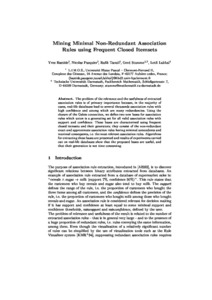Mining minimal non-redundant association rules using frequent closed itemsets
| dc.date.accessioned | 2009-02-23T15:50:07Z | |
| dc.date.available | 2009-02-23T15:50:07Z | |
| dc.date.issued | 2000 | |
| dc.identifier.uri | urn:nbn:de:hebis:34-2009022326389 | |
| dc.identifier.uri | http://hdl.handle.net/123456789/2009022326389 | |
| dc.format.extent | 253958 bytes | |
| dc.format.mimetype | application/pdf | |
| dc.language.iso | eng | |
| dc.rights | Urheberrechtlich geschützt | |
| dc.rights.uri | https://rightsstatements.org/page/InC/1.0/ | |
| dc.subject.ddc | 004 | |
| dc.title | Mining minimal non-redundant association rules using frequent closed itemsets | eng |
| dc.type | Aufsatz | |
| dcterms.abstract | The problem of the relevance and the usefulness of extracted association rules is of primary importance because, in the majority of cases, real-life databases lead to several thousands association rules with high confidence and among which are many redundancies. Using the closure of the Galois connection, we define two new bases for association rules which union is a generating set for all valid association rules with support and confidence. These bases are characterized using frequent closed itemsets and their generators; they consist of the non-redundant exact and approximate association rules having minimal antecedents and maximal consequences, i.e. the most relevant association rules. Algorithms for extracting these bases are presented and results of experiments carried out on real-life databases show that the proposed bases are useful, and that their generation is not time consuming. | eng |
| dcterms.accessRights | open access | |
| dcterms.creator | Bastide, Yves | |
| dcterms.creator | Pasquier, Nicolas | |
| dcterms.creator | Taouil, Rafik | |
| dcterms.creator | Stumme, Gerd | |
| dcterms.creator | Lakhal, Lotfi | |
| dc.description.et | Extern | ger |
| dc.description.everything | Auch erschienen in: Lloyd, John u.a. (Hrsg.): Computationa logic. (Lecture notes in computer science ; 1861). Berlin u.a. : Springer, 2000. ISBN 3-540-67797-6. (The original publication is available at www.springerlink.com) | ger |
| dc.subject.swd | Data Mining | ger |
| dc.subject.swd | Effizienter Algorithmus | ger |
Dateien zu dieser Ressource
Das Dokument erscheint in:
-
Publikationen [55]

